Q: I have two dogs, a 9-month-old pit bull mix and a 13-month-old lemon Dalmatian. When it comes to playing and toys, the Dal is very submissive and the pit bull is aggressive. I have had to break up their playing because the Dal will not let the pit know when she is getting hurt. I have since found about half a dozen scratch marks on the Dal's neck from the pit bull. How do I curb this type of behavior? I'm trying to find a way to allow me to keep both dogs, but so far have been unsuccessful.
A: This is not exactly a training problem, nor is it a "dominance" problem precisely. We have bred dogs for centuries for genetic intensification of behavioral characteristics suited to the job they are intended to do. We shouldn't be needlessly surprised when a greyhound, let off-leash, wants to run; when a guarding breed growls at strangers, when a terrier picks fights with other terriers, when a beagle wants to heel with its nose on the ground instead of in the air—and when a pit bull bites too hard and has no brakes about doing that. The genetic manipulation of fighting breeds can also include being unaware of other dogs' appeasement displays, being unacquainted with bite inhibition, and also having the capacity to spring into full-blown aggression without giving warning signals first. A tricky mix. Some pit bulls or pit mixes have none of the above inherited tendencies. Some have all. You can't tell from the outside. And you can't tell by how charming they are to people; often they are very sweet.
Here's one possible training intervention: You might use the clicker and treats to train the pittie to drop everything and rush to your side no matter what else he's doing, when you say a cue such as "Here now!" That way you could stop the roughhousing whenever you like. (Of course, even then it goes without saying that the dogs should never be alone unsupervised.)
You and the dog would both need to acquire good timing and a strong mutual reinforcement history for you to be able to get fast on-cue responses in spite of major distractions. I'd say that would involve teaching him a few other things, tricks, perhaps, all on cue with low latencies (i.e., he responds instantly) to reach this level of mutual skill. Figure two or three months of several five minute sessions a day working on maybe ten different behaviors on cue, including "Here now!" Give that a try.


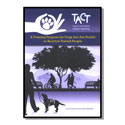
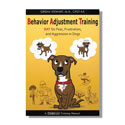
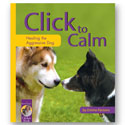
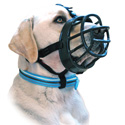
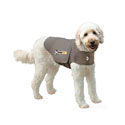

Human Toy
I have a 15 month old Golden Retreiver. He thinks I'm his human toy as I live alone. He is constantly at me to play in the evenings when I'm tired from working all day. I take him for a 2 mile walk every evening and try to play ball in the backyard to get some of his energy released. He likes to bite at my legs and almost knocks me over when we are playing in the yard. He does this sometimes in the house. When I tell him NO he just barks and comes at me harder. If I'm on the phone or the computer he tries to pull my arm away from the mouse or grabs at my hand. I'm still working on him to stay off people when they come over but he gets so excited I can't stop him. I'm having the people turn their back on him. Any advise???
Human Toy
I'm not a dog trainer but I don't think one 2 mile walk a day is sufficient exercise for a young Golden. I have mini dachshund/Jack Russell crosses and I have to walk them at least 3-6 miles a day.
Have you tried a one hour walk in the morning and then another one at night? Do you give him puzzle toys or things that challenge his mind on a daily basis? How about working on some tricks?
rough housing
We have a new boy in the house: Barney the boxer/pit mix, about a year old.
He's a sweetie, has shown no aggression whatsoever to people or dogs, takes treats gently,even with other dogs waiting right beside him. He mouths my fingers gently if I insist, most of the time, unless he's in the middle of playing with the other dogs. That's the problem: with the other pups, he chomps, and he has a huge, Great White Shark mouth. He doesn't nip them; he grabs the ham of a back leg, or takes little old McGee's whole head in his mouth, which she clearly objects to.
We intervene, of course, and our border collie in a rottie suit tries to divert his attention with toys.
Clearly, the boy can learn bite inhibition with us--how do I teach him to exercise self control with the other dogs? He's not a little bitty puppy, and I don't want them to settle it among themselves.
TIA,
Margreet
rough housing
We just bought two dachounds,one is seven weeks and the other is ten weeks,not from same people,the older one gets carried away when playing then turns on the little one.How do we stop this from happening?
Post new comment